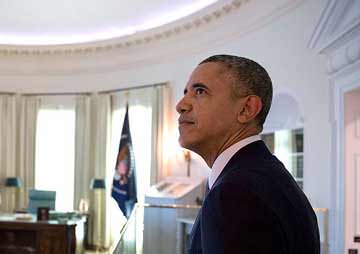President Obama, Choose Your Words Carefully
President Barack Obama, in the interview given last weekend to The New York Times' Thomas Friedman, provided illumination on his foreign policy thinking, at this moment of fraught drama in both Iraq and Ukraine, but the counsels concerning the two didn't match. White House/Pete Souza
White House/Pete Souza
White House/Pete Souza
President Barack Obama, in the interview given last weekend to The New York Times’ Thomas Friedman, provided illumination on his foreign policy thinking, at this moment of fraught drama in both Iraq and Ukraine, but the counsels concerning the two didn’t match.
He made it clear that he does not intend to take the United States more deeply into the Middle East (again!) unless the authorities there “agree to an inclusive policy of no victor/no vanquished.” He is not willing to provide an air force for one or another of the factions contending for power in Iraq, Mr. Friedman reported, although the air intervention now taking place has — so far — been to protect the Kurd, Christian, and Yazidi minorities that have been under assault by the self-proclaimed Muslim Caliphate, new name for the “Islamic State of Iraq and the Levant.”
Yet in Ukraine the United States is allied with and presumably counseling Ukrainian government forces that seem definitely set on vanquishing what remains of the pro-Russian separatists that currently hold Donetsk near the Russian border. Moreover, the silence surrounding the American and European Union roles in instigating last February’s government coup in Kiev, responsible for Russia’s retaliatory annexation of Crimea, and the uprising among the Russian-speaking community in eastern Ukraine that continues today.
At the same time NATO insists that Russia has again moved a considerable body of troops to near the Ukraine border where they are in a position, they say, to conduct a “humanitarian” intervention, accompanied by representatives of the International Red Cross. NATO claims this will really be a disguised invasion to reinforce the separatists now under government siege in and around the city of Donetsk, and implies that any border crossing means war.
A separatist leader, Alexander Zakharchenko, during the weekend offered an apparently unconditional ceasefire to forestall further casualties — to no evident result — and the British and German governments both are said to have told Moscow that any intervention, however “humanitarian” its claimed purpose, would break international law; but neither seemed to attach any military threat to the warning, and international law ceased some time ago to be a consideration in Washington.
One would nonetheless think this might be the moment to talk with Russia about compromise and neutralization on the Russo-Ukrainian border and political federalism of some kind among the Ukrainian-speaking and Russo-phone Ukrainians, with the official Americans and EU representatives in Kiev going home, and President Obama calling off the neo-conservatives in his government who seem to have been behind all this. Enough people have already purposelessly been murdered.
According to a New York Times report, the Ukraine military leadership has been pressing its offensive on the assumption that intervention by the Russians will not happen because President Putin would consider it an unacceptable risk, what with the sanctions already imposed and NATO’s Secretary General Anders Fogh Rasmussen making belligerent speeches.
Trust in Russian restraint, however, may be a considerable gamble, considering the fear and hostility that has been whipped up inside Russia by government propaganda about the “fascist” threat from Ukraine, and the supposed desperate plight of the Russian-speaking minority in the Ukrainian population. Mr. Putin has a sizable political stake on the table in Moscow — as elsewhere.
Possibly Barack Obama’s Times interview will reassure him. Mr. Obama said that President Putin “could invade Ukraine” at any time, but if he did, “trying to find our way back to a cooperative functioning relationship with Russia during the remainder of my term will be much more difficult.” This does not seem a threat likely to make Mr. Putin’s blood run cold. It sounds as if Mr. Obama should check it out with Secretary General Rasmussen and those Americans who have been busy in Kiev. He might also illuminate his government’s as yet unexplained, and seemingly pointless, campaign since last February (and before) to get Ukraine into the Western Alliance and into NATO. What does this accomplish, other than make trouble?
The American president also seemed similarly casual on the Middle East when speaking to Mr. Friedman. “The broader point we need to stay focused on is [that] what we have is a disaffected Sunni minority in the case of Iraq, a majority in the case of Syria….Unless we can give them a formula that speaks to the aspirations of that population, we are inevitably going to have problems….Unfortunately, there was a period of time where the Shia majority in Iraq didn’t fully understand that.”
As for the new “Islamic Caliphate,” which has run roughshod over the Iraqi army, and driven the Kurds and other minorities northwards into refuge, President Obama said, “I think it has very little appeal to ordinary Sunnis.” That strikes me as the kind of offhand remark presidents should never make.
Visit William Pfaff’s website for more on his latest book, “The Irony of Manifest Destiny: The Tragedy of America’s Foreign Policy” (Walker & Co., $25), at www.williampfaff.com.
© 2014 Tribune Media Services, Inc.
Your support matters…Independent journalism is under threat and overshadowed by heavily funded mainstream media.
You can help level the playing field. Become a member.
Your tax-deductible contribution keeps us digging beneath the headlines to give you thought-provoking, investigative reporting and analysis that unearths what's really happening- without compromise.
Give today to support our courageous, independent journalists.






You need to be a supporter to comment.
There are currently no responses to this article.
Be the first to respond.